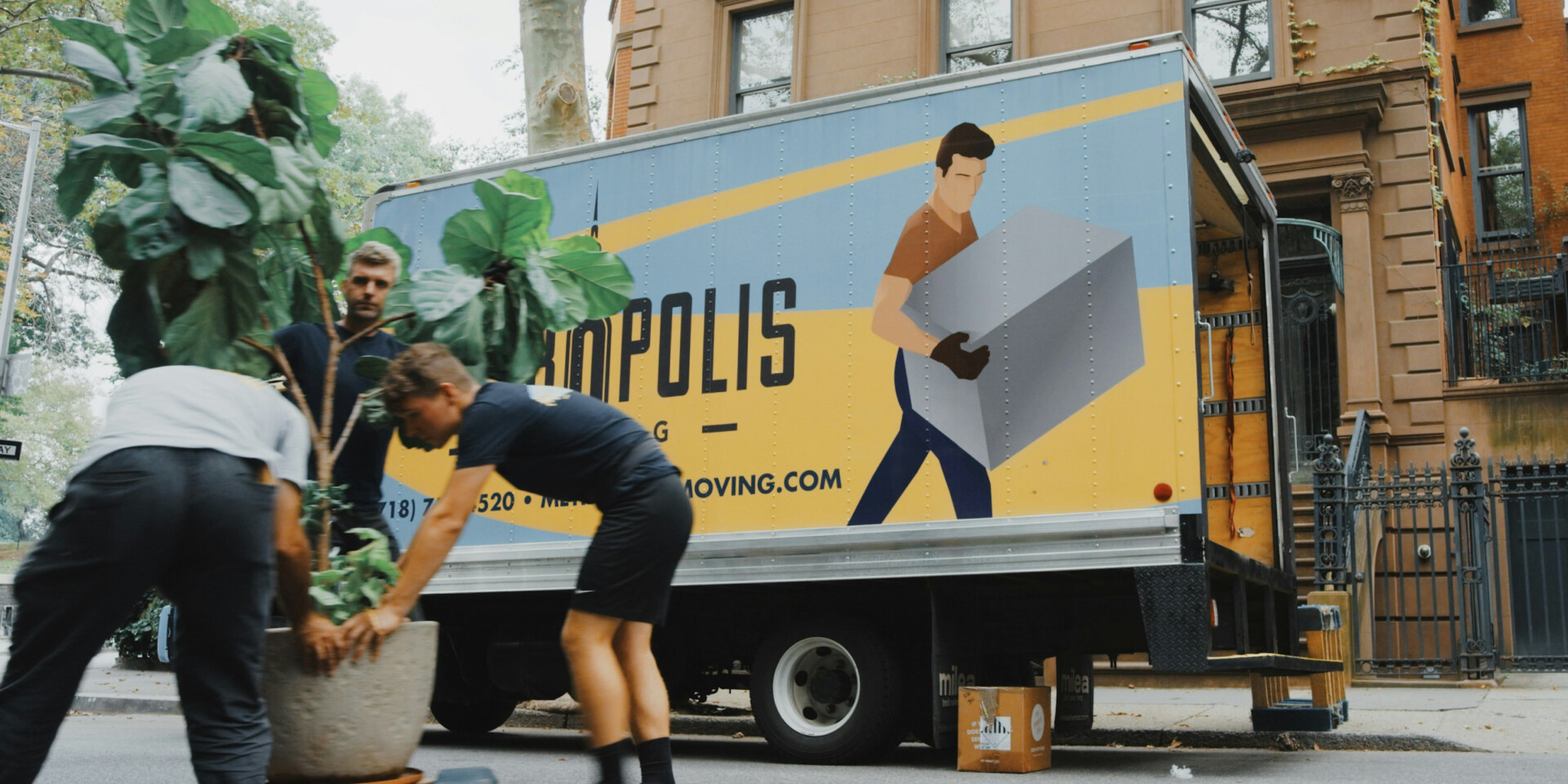The Ultimate Guide to Renting an Apartment

When do I start my apartment search? What questions should I be asking? How much should I spend on rent? What neighborhood fits me best? What qualifies as a good deal, even? Is the pricing online accurate?
All questions essential to the science of apartment hunting. There’s so much that goes into finding a place to call home and the little things that slip through the cracks can come back to bite you in the butt later. Whether you’re a first-time renter or a seasoned pro, finding the right apartment can be tedious, overwhelming, and just plain annoying.
Obviously, Smart City can help you find your next place but in any case, if we’re not in your city (yet) or you want to take a swing on your own, we got you! Here’s the Ultimate Guide to Renting, broken down into digestible phases.
Let us do the work!
Get connected with an agent
1. Consider the important stuff
YOUR NEEDS
Before you deep-dive into the vastness of internet apartment searches and start scheduling tours, there are a few things to consider:
- Budget: What can you comfortably afford with your current income?
- Location: Which neighborhood fits your lifestyle?
- Finishes and layout: One, two, three bedrooms? Floor-to-ceiling windows?
- Roommates: Living alone or sharing your space?
- Pets: Accommodating a pet(s) or wanting to become a pet parent?
BUDGET
There’s base rent, but there are also up-front and additional monthly fees you should consider when creating your budget.
On top of the rent you pay monthly, you’ll have several additional monthly costs. Here are common fees and cost ranges we see:
- Utilities (water, electric, gas—$100-$200)
- WiFi ($50-$100)
- Renters insurance (psst…We recommend Lemonade to our clients because it’s easy to use and super affordable — some clients manage to pay as little as $5/mo! Get your free quote for Lemonade right here.)
- For pet owners—pet rent ($15-35)
- Amenity fees ($5-$10)
- Valet Trash ($15-$35)
Then, you’ll want to get comfortable setting aside the up-front fees you’ll pay once, at the time of signing and/or moving in:
- Application fee ($50-$100)
- Administrative fee ($50-$100)
- Deposit ($200 – 1 month’s rent depending on how you qualify!)
- For pet owners—pet fees & deposit ($100-$500)
From there, you can determine your “all bills included” budget. This doesn’t only mean what you can qualify for, but also what you can comfortably afford to pay every single month for the entirety of your lease. You’ll also ensure you save enough to pay those up-front fees once you decide where to lease!
When it comes to rent cost, a healthy rule of thumb, and what most properties approve applications based on, is that monthly rent sits right around one-third of a lease holder’s monthly income. A quick way to calculate this number is by taking your monthly net income (after taxes) and multiply it by either .25 or .35 and voila — a rental budget! This equation might not be realistic for everyone, but it serves as a great starting point.
Pro tip: create a spreadsheet and note your monthly income and expenses, then allocate rental and spending budgets from the remaining amount. You’ll thank us later.
UNDERSTANDING SPECIALS
Specials and Concessions – One way that leasing your dream apartment can become more affordable is by scoring, what we in the “biz” call, a special or concession. That’s money back in your pocket!
When a property is working to lease up their units, it’s not uncommon for them to offer rent specials and discounts, making what might initially be a more expensive apartment much more affordable. *the coupon-er in all of us rejoices*
“Read” the fine print by getting a little clarity – Ask if the special is prorated or upfront. In other words, will your savings happen as a large sum in the first few months of you moving in or will it be spread out throughout your lease, lowering the overall monthly rate? To better understand the different types of savings and how to apply them, read our blog on specials, concessions, and self-prorating.
When talking specials, here are two very important terms you should be familiar with:
- Market Rate – This is the monthly rate of a unit before any special or concession is applied. It is what the renting market says a unit is worth, and it changes every day as supply and demand fluctuate. Most properties approve residents based on a net income of three times the MARKET rate.
- Effective Rent, aka “Net Rent” –This is the monthly rate of a unit (or set of units) after all specials, concessions, and discounts have been applied.
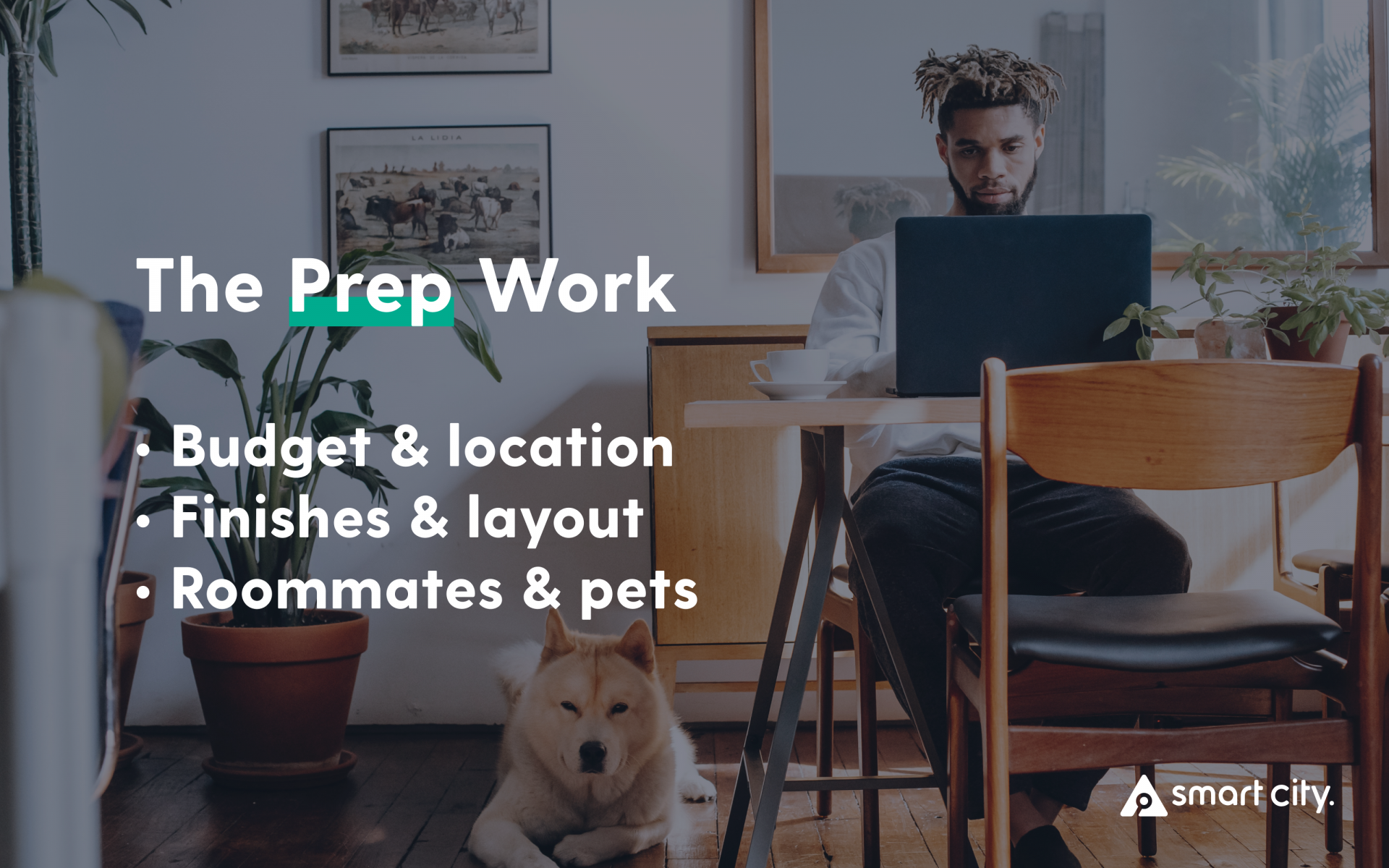
LOCATION
We have found that many of our clients have a preference for location over apartment finishes when it comes to budget compromises, and we get it! Whether in downtown or the ‘burbs, the location of your next apartment equals the community you become a part of, the streets you drive every day, the shops, restaurants, and bars you spend time and money at on the weekends; it’s important!
Should you live close to work? What about walkability to things like a grocery store, nightlife, parks and outdoor trails, retail stores, or schools? We have found that the biggest factors that play a role in our clients selecting their next apartment location are commute time, walkability, and price. If there’s a certain neighborhood you love, compare pricing in that area and have a few backups just in case.
Here are some other things to consider when determining a neighborhood fits your needs:
- What you do for fun and where you spend most of your free time (at the gym, checking out live music, hitting up clubs, chowing down at restaurants, getting pretty neat with nature, etc.) and the proximity to those things.
- Proximity to your friends/significant other.
- What types of noise you can and can’t tolerate (traffic, nightlife, trains, etc.)?
- What are the things you want out of a community (because you’ll be married to it for close to a year)?
FINISHES AND LAYOUT
Size matters…especially in relation to your living space and lifestyle. Unit floor plans range anywhere from micro to two or three bedrooms, but not all layouts are created equal. You definitely want to find a layout that offers up the amount of efficient space you need for furniture, storage, and living.
Something to note is that square footage does not always equal “more” if the layout limits how you can use the space. Here’s how to identify if a layout is efficient or full of dead space so you can choose a floor plan that fits your needs (and that king-size bed).
When it comes to finishes, there are options! Most properties offer more than one color scheme to choose from. Cost varies depending on which you choose and there is typically always an opportunity to upgrade in some way, shape, or form. Sometimes these upgrades present themselves as technology packages, but you’ll also have options such as corner units, wrap-around balconies, yards, kitchen islands, etc.
ROOMMATES
There are significant pros and cons to renting with a roomie. Sometimes it seems like it’s not even a question as to whether or not you should get that two-bedroom apartment downtown with your college bestie, but it’s always good to see it from every angle.
Pros of having a roommate: Having a roommate generally means cheaper rent and bills, splitting rent also means you can afford a fancier/larger apartment; built-in friend, hangout/going out partner, or just someone to socialize with (because we all get lonely sometimes)
Cons of having a roommate: Less privacy, more distractions, aka unwanted visitors and noise; cleanliness and hygiene issues — you left your bowl in the sink… again!
PETS
Let’s talk about the real MVPs in our lives – our furry (or scaley) little friends! Almost all apartments have breed and exotic pet restrictions, weight limits, and a cap on the number of pets you can have. Some properties may not even allow pets *gasp*, and on the other hand, some properties don’t limit pet owners at all!
Almost every property that allows pets requires the pet owners to pay a fee and deposit in conjunction with other application fees, as well as monthly pet rent. Sure, pet fees can be steep sometimes, but sneaking in a pet can result in even steeper charges or even getting evicted. Evictions can definitely be a game-changer when you’re looking for your next-next apartment, so *Joey voice* forget about itttt!
If you’re renting with an Emotional Support Animal (ESA), here’s everything you need to know!
If you’re an innocent bystander and your roommate will be the one with the pet, let it be known that everyone on the lease will be more than likely held responsible for any damage caused by the said pet. Therefore, the cute little critter may not be your direct responsibility, but you’ll definitely want to read the fine print with your roommate to make sure everyone’s on the same page prior to signing your lease.
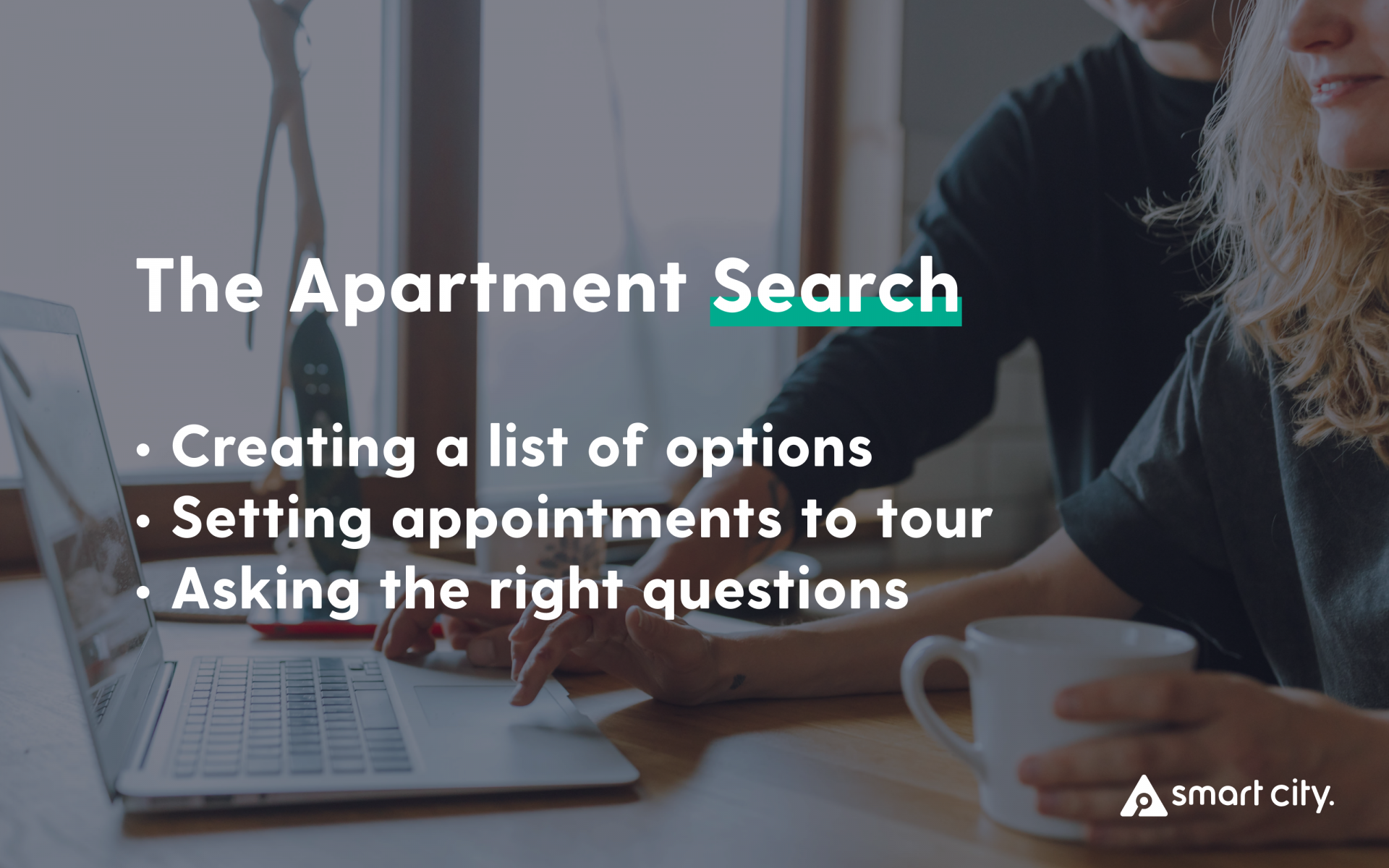
2. Apartment hunting
SETTING UP TOURS
Now that you’ve scrubbed every inch of the deep, dark apartment-hunting web, it’s time to call your favorite properties to set up appointments to tour! Even if the photos online are *chef’s kiss*, make sure you tour the properties you like most so that you can get a more accurate feel for where you’d be living. Tours can be set up online, over the phone, and sometimes even through social media channels for the property.
Pro tip:Try to schedule tours at multiple properties on the same day (weekends seem to work better) so that each place is fresh in your mind and easier to compare to one another.
TOURING
The day has finally arrived for you to see your potential home in person. This is the time for you to look over everything with a fine-tooth comb and ask any questions you have about the unit, property and leasing staff, and the surrounding area. No one likes a move-in day surprise!
Be as observant as possible while touring and keep an eye out for things like:
- Mold
- Broken/damaged items (i.e. tiles, windows, washer & dryer)
- Water damage
- Holes in the wall
- Condition of the floors
- Cell reception
- Water pressure
- Storage space (especially in the kitchen/pantry)
- Security/ property entry access
- Green space for your pup
- Parking & visitor parking
- Commute with traffic and without traffic
- Life around the property
Pro tip: Take stock of your current furniture measurements and bring a measuring tape with you so you have an accurate idea of what will fit and what won’t. Also, take photos of everything you tour so you can review later when you’re comparing properties.
ASKING THE RIGHT QUESTIONS
In order to feel comfortable and safe in whichever apartment you choose, ask the leasing agents all the questions you may have while touring.
Try asking things, like:
- What is the neighborhood like? Quiet? Lively?
- Have any homes or cars been broken into in this area recently?
- What is the pet policy and weight limit?
- Are any utilities included in the rent? (A lot of the time, water and trash are)
- Which fees are due at application, and which are due at move-in?
- What is refunded if you decide to cancel?
- What is the parking situation like?
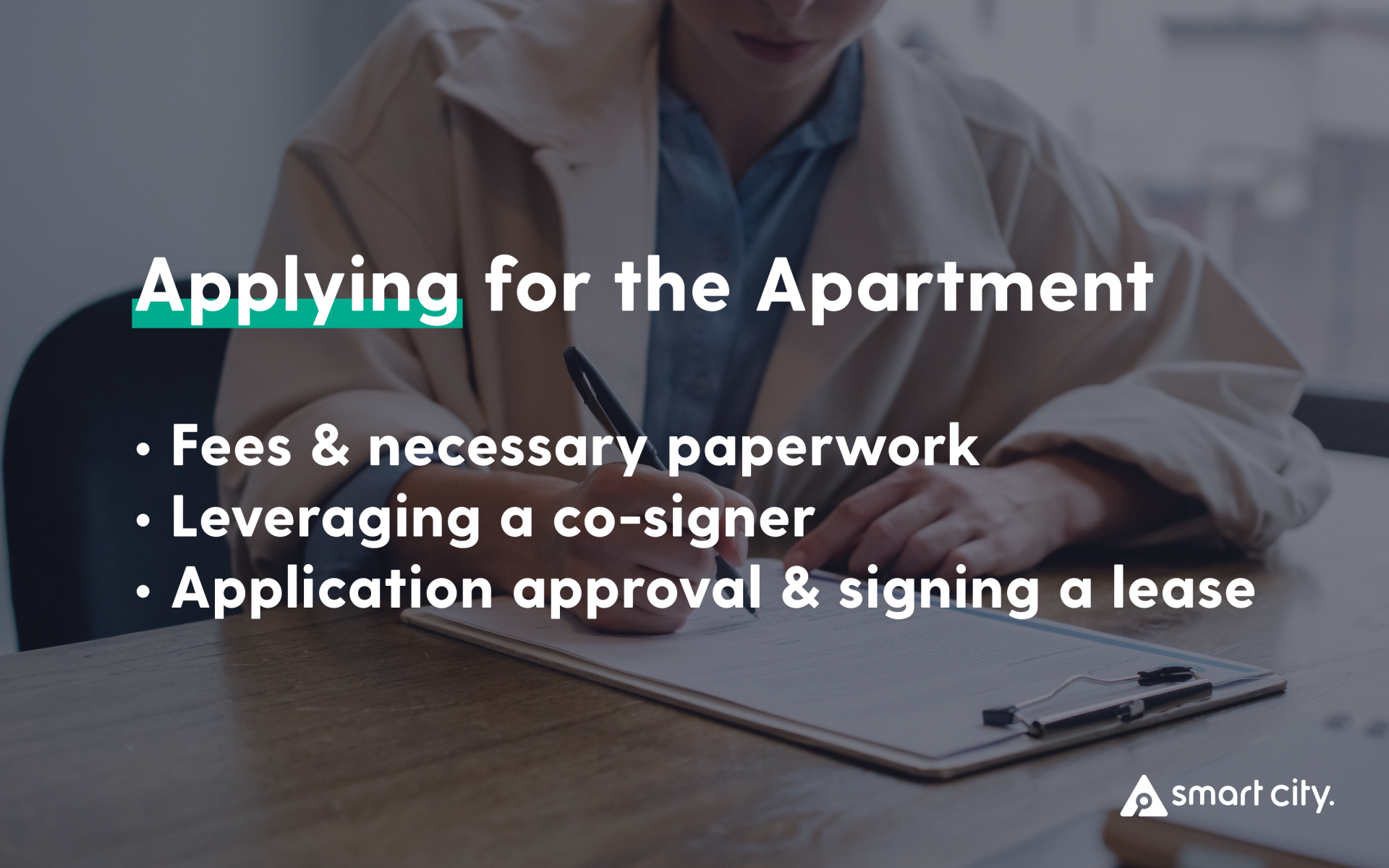
3. Applying for an apartment
Once you’ve narrowed down your list, it’s time to start applying ASAP. Turning in the application and paying any fees is what pulls the apartment off the market and secures it. The application process can take a bit of time, and you will be expected to provide multiple pieces of personal information and pay fees in addition to filling out the application. Properties usually require:
APPLICATION FEES
Fees typically consist of a per-person application fee, administration fee, and deposit. Fee amounts depend on the property and the deposit can be a hefty expense depending on credit and income. Sometimes properties will waive application and admin fees, or cut deposit costs as move-in specials! The good news is a lot of properties have cancellation policies where you are refunded your money. However, not all properties do this so it is definitely wise to ask before you start your application.
NECESSARY DOCUMENTS
Proof of Income – Properties will ask you to submit documentation, such as two or three recent pay stubs, employer letters, or a W-2 tax form (only if you have been with the job for more than a year). You will only need to submit one type of document, so ask to see which they prefer or whichever one is easiest for you to provide.
Social security and driver’s license – You’ll be asked to provide copies of your social security and driver’s license in order to run credit and background checks. This is how properties assess the amount of risk they will take on if you become their resident based on your prior financial, criminal and rental history.
Co-signer application – Sometimes you need a co-signer or guarantor when you don’t make enough or your credit is low. Having a co-signer isn’t a bad thing, especially if you don’t have any rental history. Since the property won’t have any information to verify how dependable you will be with paying rent or if you’ve caused any damages before, they will feel more comfortable leasing to you with a co-signer, who has good credit and a strong financial background.
Vehicle registration and proof of insurance – This isn’t always required, but a lot of apartment properties have parking garages or lots that require a parking sticker or pass to park. They need your vehicle registration and proof of insurance in order to give you that pass to make sure you don’t get towed. Make sure you get a ton of clarity around guest parking so your friends or boo-thing don’t get towed when they stay over.
SUBMITTING YOUR APPLICATION
Once you have completed the application and collected all the necessary documents as mentioned above, then it is time to submit it. There are four ways you can send in an application via mail, in person, email, or the most popular one, online. For the most part, applications take around 24 to 72 hours to be processed but you can always call or check online (if you created an account) for the status of your application.
If you’re worried about your application being denied based on reasons like rental history, credit, or similar issues, check out our guide to dealing with apartment application denials to ensure you’re on track for an approval.
SIGNING THE LEASE
Hurray, you’ve been approved! Once your application has been approved, it is time to sign your lease. The lease will cover all expectations for the term (normally apartments are rented for 12-15 months), rent, pets, maintenance, subletting, termination, and other aspects of renting.
Before signing anything, read through the lease thoroughly to make sure you understand everything, and if you have any additional questions this would be the time to ask. Expect the lease-signing process to take a little bit because you will be covering a lot. You also might have to pay the first month’s rent and move-in fees at the time of signing, but they also may have you wait until your actual move-in day to pay those.
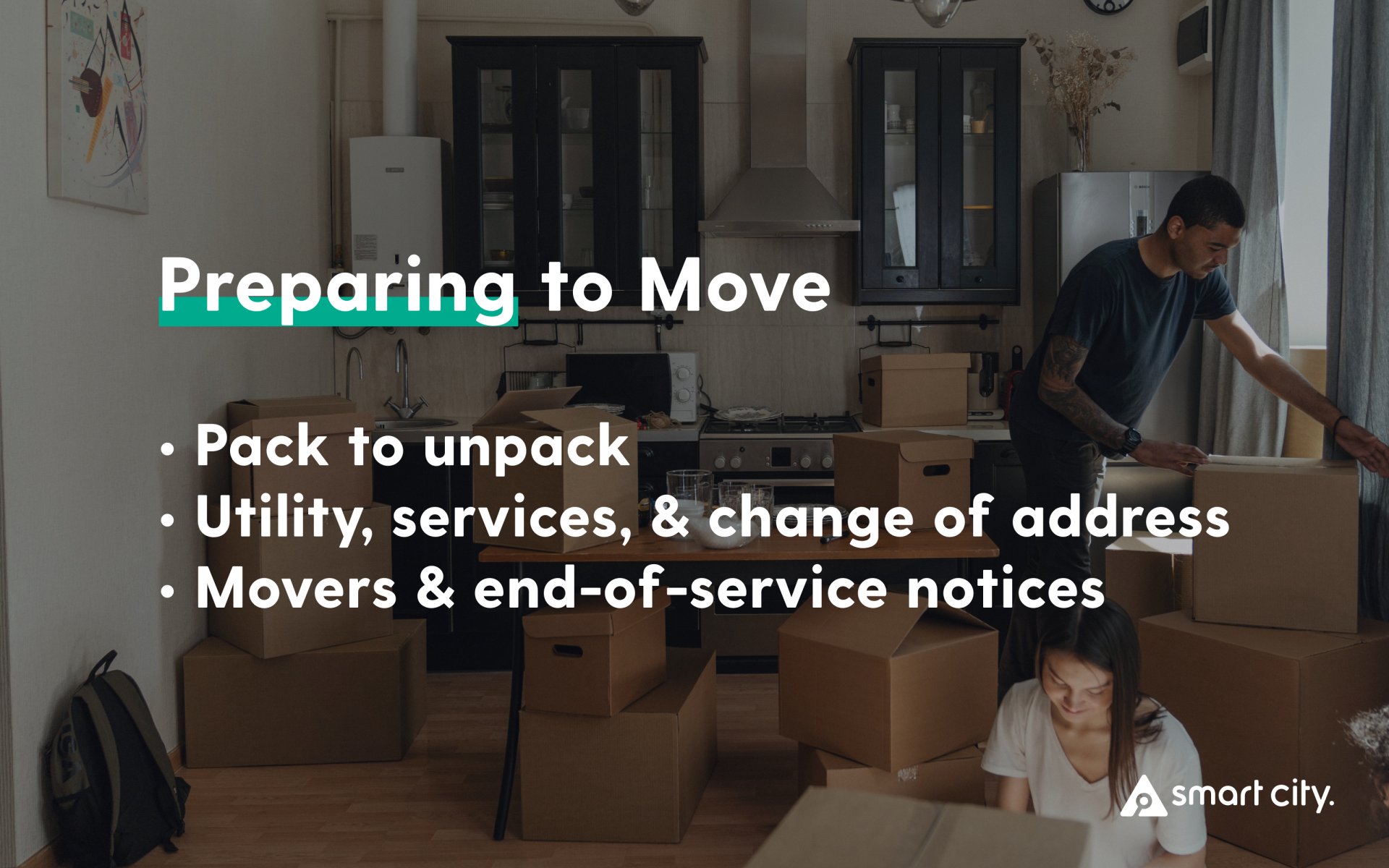
4. Pre-move-in tasks
Between packing your stuff up, loading it in the moving truck, unloading, and unpacking, moving can be a little overwhelming, to say the least. Here are a few tips to make moving a little less painful.
PACK TO UNPACK
Start with the end in mind — It’s easy to get disorganized in a move, especially when it comes to packing. To stay organized and make unpacking easier, group things by room such as kitchen, bedroom, bathroom, and so forth when packing. Make sure to label everything clearly that way you know what is in each box and where it goes. We recommend using strips of colored paper or a variant of duct tape colors to make the boxes easily recognizable.
Get packing materials
This one may seem a little obvious, but having packing materials ahead of time will help you out greatly. Utilizing the correct packing materials will ensure items are packed securely and decrease breakage. Here’s a shortlist of helpful moving resources:
- Moving boxes
- Packing tape
- Packing paper
- Bubble wrap
- Moving blankets
- Saran wrap
UTILITIES AND SERVICES
Depending on your new apartment and what they include in rent, will determine which utilities you will need to set up yourself. Most properties include or have an extra fee for water, trash, and pest on your monthly rent statement, making it convenient for you to have everything in one place. Normally the only utilities you need to set up are electricity and gas.
We created Smart City Concierge to help renters get set up with services stress-free — but if you’re choosing to go at it alone, you can ask the apartment complex which companies they recommend and then call each company individually to set up your account. Once you get them set up, keep all of the important utility information such as account numbers, usernames, passwords, and phone numbers in one place. That way you have easy access to them and won’t have to reset your password a million times.
Just like with your utilities, set up any services you would like to have such as cable, internet, and phone. Call ahead of time to set up your services and to schedule a time for them to come out to install, this way you have more options are installment dates. Because no one wants to wait a week or weeks on setting up their internet.
If you’re not carrying over utility providers and services from a current residence and those monthly expenses are hosted in your name, make sure you contact your providers to cancel. If you are able to continue with the providers you’re currently using, then contact them to let them know about the change of address and any installation logistics.
CHANGE OF ADDRESS
The final and most overlooked step is notifying companies and people of your new address. Here is a list of people and companies you need to update with your new address.
Family and Friends – You definitely want to update your family and close friends about your new pad. How else will they know where the party is?
Current Employer – In order to process your taxes and in case of emergencies, it’s very important to update your address with your employer.
Post Office – Even though it would be nice to not get pre-approved credit cards, you still need to let the post office know of your address change in order to receive important mail like birthday cards from grandma. PRO TIP: you can also do this online for $1.
Banks, Financial Institutions, and Credit Card Companies – Call or update your address online, depending on the financial institution. When that’s done, be on the lookout for some form of confirmation via mail or email.
Insurance Companies – Did you know that your insurance rate could change based on your location? It is critical to have the correct information because that could mean more money in your pocket. Keep in mind, to file claims you will need up-to-date contact information.
Department of Motor Vehicles –Make sure to update your driver’s license and car registration information.
Educational Institutions – Depending on if you are in school or have kids in school, you need to notify the school of your change in address.
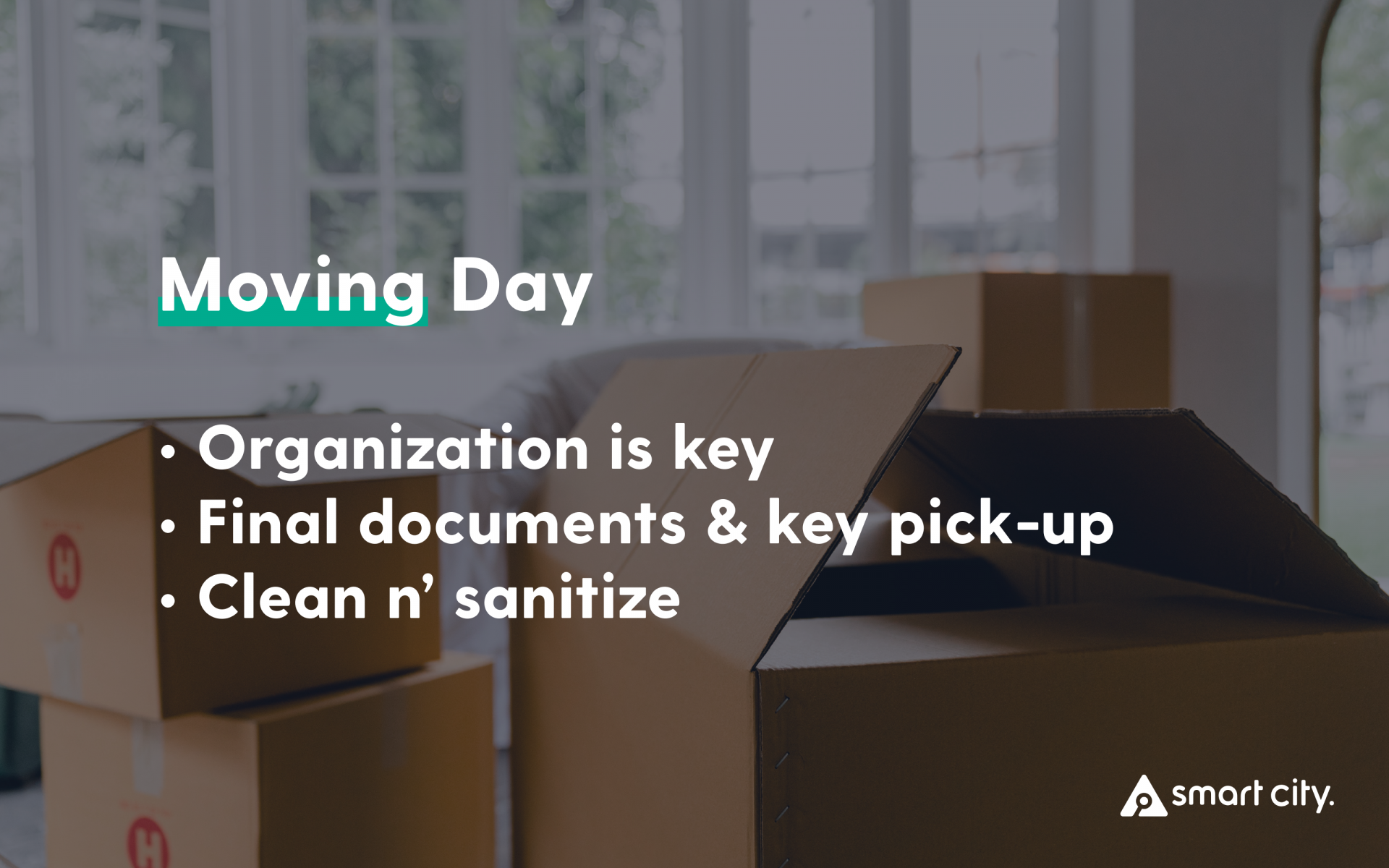
5. Making the move
HERE’S THE KEY(S)
The day has finally come to pick up your keys to your new amazing pad! When it comes to getting your keys there are a few things you need to provide:
- Proof of renter’s insurance
- Proof that you set up utilities (electric, water, and gas if they aren’t included)
- Paying any final fees (Check beforehand on the form of payment for final fees. You don’t want to be running around like a headless chicken trying to get a money order on your move-in day.)
Most properties allow you to provide these things a few days before your move date or on your move date. If you provide them before your actual move date, you may be able to grab your keys a day early to help the moving process go more smoothly.
MOVING HELP
Moving on your own is never fun. We recommend either bribing your friend with a truck to cart your stuff across town, renting a moving truck, or hiring movers to do the heavy lifting.
Our Smart City Connect team partners with movers in your city to get you discounts — 10% off is no joke when it comes to moving costs! If you are willing to spend a little extra cash, movers are kind of the best thing ever. They can cut the moving time in half, plus, you don’t really have to do anything except supervise!
KEEP IT CLEAN
After you pick up your keys, the first thing you should do is go straight to your new unit and wipe down the counters, floor, and cabinets. Believe us — this plays out well in the end. Otherwise, it may never feel crisp after everything’s moved in.
Just so you are prepared, there may be a few hiccups on your move day such as rain, the movers getting delayed, or even the elevator breaking…nightmare central! So, make sure to take deep breaths and know it will all work out in the end.
We hope this information has been helpful, but if you need a little extra guidance, let us know! Our service is free and all you have to do is tell us what you’re looking for. If you want to learn more, check us out. Be sure to stalk us on Instagram, too, for the best apartment deals in cities across the country – just search “Smart City” and all the markets we serve will pop up!
